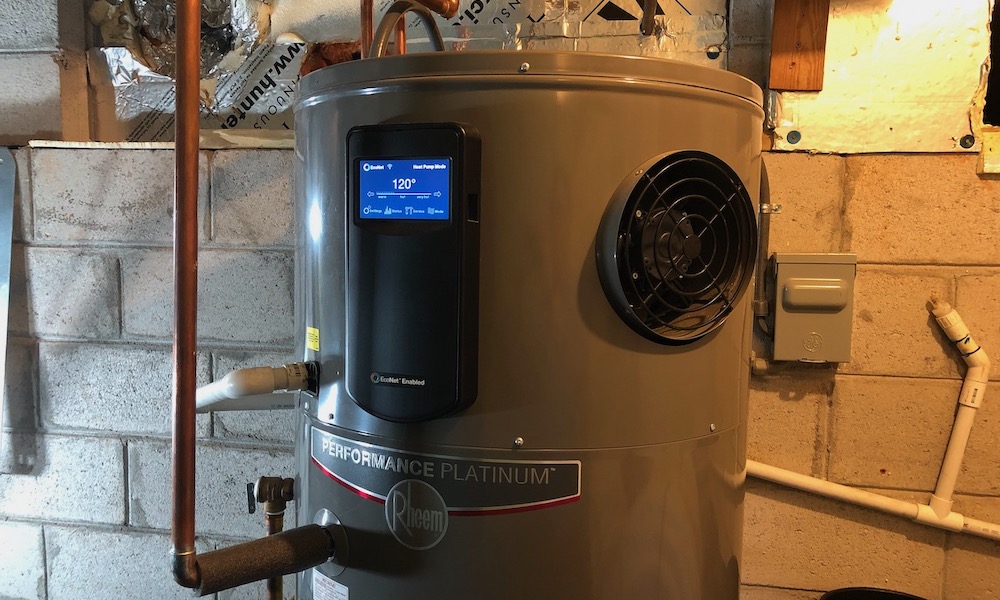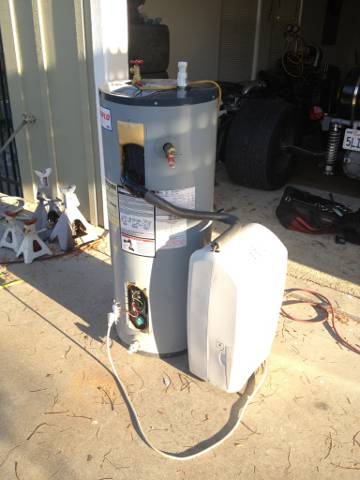Yes, heat pump water heaters can dehumidify. They extract moisture from the air while heating water.
Heat pump water heaters are energy-efficient systems designed to heat water using ambient air. They work by transferring heat rather than generating it, making them an eco-friendly choice. In addition to heating water, these units naturally dehumidify the surrounding area.
This feature can be especially beneficial in humid climates, improving indoor air quality. By lowering humidity levels, heat pump water heaters create a more comfortable living environment. Understanding how these systems operate helps homeowners make informed decisions about their water heating needs. Choosing the right unit can lead to significant energy savings and enhanced comfort in your home.
Page Contents
- 1 Introduction To Heat Pump Water Heaters
- 2 The Dehumidification Process
- 3 Heat Pumps In Action
- 4 Evaluating Dehumidification Effectiveness
- 5 Benefits Of Using Heat Pump Water Heaters
- 6 Installation Considerations
- 7 Maintenance And Troubleshooting
- 8 Case Studies And User Experiences
- 9 Comparing Alternatives
- 10 Looking Ahead
- 11 Conclusion
Introduction To Heat Pump Water Heaters
Heat pump water heaters use electricity to move heat. They are different from traditional models. Traditional heaters generate heat by burning fuel or using electric resistance. Heat pump models capture heat from the air or ground. This makes them more efficient than standard heaters.
Heat pump water heaters can also dehumidify spaces. As they draw heat from the air, they cool the air around them. This process removes moisture from the air, making a room feel less humid. It can improve indoor comfort during warm seasons.

Credit: www.energyvanguard.com
The Dehumidification Process
Heat pump water heaters can help control air moisture. They work by using a refrigerant to absorb heat from the air. This process cools the air, which leads to condensation. Moisture in the air turns into water droplets. These droplets are collected and drained away.
In warm months, dehumidification helps make spaces feel more comfortable. This reduces humidity levels. A lower humidity level prevents the growth of mold and mildew. Proper moisture control is important for indoor health.
Using heat pumps for water heating can be an energy-efficient choice. They save money on energy bills. Understanding how they work helps in making informed decisions about home comfort.
Heat Pumps In Action
Heat pump water heaters work by moving heat from one place to another. They use three main components: the evaporator, compressor, and condenser. The evaporator absorbs heat from the air. It turns refrigerant into gas. Next, the compressor increases the gas pressure and temperature. Finally, the condenser releases heat into the water tank. This cycle keeps the water warm.
Heat pumps also help with dehumidification. As they cool the air, moisture condenses. This process reduces humidity levels. A lower humidity level makes spaces feel more comfortable.
| Component | Function |
|---|---|
| Evaporator | Absorbs heat from the air |
| Compressor | Increases pressure and temperature |
| Condenser | Releases heat into the water |

Credit: ecorenovator.org
Evaluating Dehumidification Effectiveness
Heat pump water heaters can help reduce humidity levels. They work by pulling moisture from the air while heating water. This process can lead to a drier environment, especially in humid areas.
Measuring humidity levels is important to understand their effectiveness. Use a hygrometer to check indoor humidity. Ideal levels are between 30% and 50%. Higher levels can cause discomfort and mold growth.
| Factors | Description |
|---|---|
| Temperature | Higher temperatures can increase humidity levels. |
| Ventilation | Good airflow helps reduce moisture in the air. |
| Usage | Activities like cooking and showering add humidity. |
Benefits Of Using Heat Pump Water Heaters
Heat pump water heaters are known for their energy efficiency. They use less energy than traditional systems. This leads to significant cost savings on utility bills. Homeowners can enjoy lower energy costs every month.
These systems also improve air quality. They remove moisture from the air while heating water. This process helps to create a more comfortable indoor environment. Less humidity means fewer allergens and a healthier home.

Credit: www.efficiencymaine.com
Installation Considerations
Choosing the right location for your heat pump water heater can improve dehumidification. Ideal spots include basements and areas with high humidity. Avoid placing it near cold drafts or heat sources. This helps maintain optimal temperature for efficiency.
For a professional installation, hire a certified technician. They ensure correct placement and connections. A DIY installation can save money but may lead to errors. Mistakes can cause reduced efficiency or safety risks. Consider your skill level before choosing.
Maintenance And Troubleshooting
Regular maintenance ensures your heat pump water heater works well. Clean the filters every few months to prevent dust buildup. Check the drain pan for any clogs or leaks. Inspect the anode rod annually and replace it if needed. Ensure the temperature settings are correct for efficient operation.
Common issues can arise with heat pump water heaters. Insufficient hot water may occur due to a dirty filter. If you notice strange noises, check for loose parts or debris. Leaks can happen; inspect the connections and seals. For foul odors, clean the tank and check for bacteria growth.
Case Studies And User Experiences
Many users report that heat pump water heaters do help with dehumidification. They notice a decrease in humidity levels in their homes. Some users in humid climates see a big difference. Their homes feel more comfortable and cooler.
In several case studies, homeowners shared positive experiences. They found that these systems not only provide hot water but also reduce moisture. This added benefit makes them a popular choice among consumers.
| User | Feedback |
|---|---|
| John D. | Noticed lower humidity and better air quality. |
| Lisa M. | Feels cooler in summer and saves on energy bills. |
| Mark T. | Great for reducing musty smells in the basement. |
Comparing Alternatives
Heat pump water heaters are not just for heating water. They can also dehumidify the air. This feature helps reduce humidity in your home. Some alternatives include traditional water heaters and tankless options. Each type has its own advantages.
Traditional water heaters are simple and easy to install. They heat water using gas or electricity. Tankless water heaters provide hot water on demand. They save space and energy but may have higher upfront costs.
| Water Heater Type | Advantages | Disadvantages |
|---|---|---|
| Traditional | Easy to install, lower cost | Less energy efficient |
| Tankless | Space-saving, energy-efficient | Higher initial cost |
Choosing a heat pump water heater is wise in humid climates. It helps to maintain comfort and lower energy bills.
Looking Ahead
Innovations in heat pump technology are changing water heating. These systems can also dehumidify spaces efficiently. They use the heat from the air to warm water. This process takes less energy than traditional systems.
New models feature improved energy efficiency. This means lower utility bills for consumers. Advanced sensors help optimize performance. Smart technology allows for remote control and monitoring.
Future designs may include integrated systems. These systems can provide both heating and cooling. They will likely feature enhanced filtration for better air quality. Overall, advancements promise to make homes more comfortable.
Conclusion
Heat pump water heaters can indeed dehumidify your space. They pull moisture from the air while heating water. This dual function can improve indoor comfort, especially in humid climates. Investing in a heat pump water heater offers energy efficiency and added benefits for your home’s air quality.
Enjoy a drier, more comfortable environment today!
